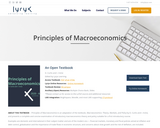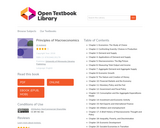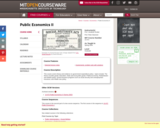
This can serve as the text for a 1-hour Undergraduate Level Patent Law Class
- Subject:
- Business
- Management
- Material Type:
- Textbook
- Provider:
- Open OKState
- Author:
- Michael Schuster
- Date Added:
- 12/03/2020

This can serve as the text for a 1-hour Undergraduate Level Patent Law Class

Planning Economics will apply microeconomic theory to issues that markets don't always handle well and so are not usually covered in a standard microeconomics course. Issues for this year include global warming, how you value a national park, the economics and politics of New York City development, how cities form and why people are willing to pay more to live in, say, the Boston Metro area, than they would pay to live in rural North Dakota, and how to evaluate costs and benefits that occur at different points in time.

Intensive coverage of precision engineering theory, heuristics, and applications pertaining to the design of systems ranging from consumer products to machine tools. Topics covered include: economics, project management, and design philosophy; principles of accuracy, repeatability, and resolution; error budgeting; sensors; sensor mounting; systems design; bearings; actuators and transmissions; system integration driven by functional requirements and operating physics. Emphasis on developing creative designs which are optimized by analytical techniques applied via spreadsheets. Many real-world examples are given, and classwork and tests are based on mini-design problems. From the course home page: This is a projects course with lectures consisting of design teams presenting their work and the class helping to develop solutions; thereby everyone learning from everyone's projects.

Principles of Economics covers scope and sequence requirements for a two-semester introductory economics course. The authors take a balanced approach to micro- and macroeconomics, to both Keynesian and classical views, and to the theory and application of economics concepts. The text also includes many current examples, which are handled in a politically equitable way.

Flat World Knowledge is thrilled to publish a first edition re-launch of Tim Tregarthen’s acclaimed Principles of Economics book, and proud to bring Tim's remarkable talents as a teacher to future generations of students.In 1996, Tim published the first edition of his principles of economics textbook to great acclaim, and it became widely used in colleges around the country. That same year, MS made him wheelchair-bound. The disease forced his retirement from teaching at the University of Colorado at Colorado Springs in 1998. He lost the use of his arms in 2001 and has been quadriplegic ever since.Tim never let his disease get him down. In fact, he turned back to his love of writing and teaching for inspiration. He obtained a voice-activated computer, recruited a co-author, Libby Rittenberg of Colorado College, and turned his attention to revising his principles of economics book.Today we are excited to introduce Libby Rittenberg and Timothy Tregarthen’s Principles of Economics. The authors teach economics as the study of “choice “ by providing students with an accessible, straightforward overview of economics. This text combines the clarity and writing of Tregarthen's seminal periodical "The Margin" with great teaching insights.Rittenberg and Tregarthen help students to understand how real individuals actually work with economics. In this new book, the authors illustrate the practicality and relevance of economics with a variety of new illustrations and insights.The authors take a three-pronged approach to every concept: (1) the concept is covered with a “Heads Up” to ward off confusion, (2) a “You Try It” section makes sure students are staying on top of the concept and (3) a “Case and Point” section that uses a real-world application to harness the concept in reality. For one example of how this plays out in the text see "Chapter 3, Section 2 on Supply." hereThis book is intended for a two-semester course in economics taught out of the social sciences or business school.

Principles of Macroeconomics is an adaptation of the text, Macroeconomics: Theory, Markets, and Policy by D. Curtis and I. Irvine, and presents a complete and concise examination of introductory macroeconomics theory and policy suitable for a first introductory course.
Examples are domestic and international in their subject matter and are of the modern era -- financial markets, monetary and fiscal policies aimed at inflation and debt control, globalization and the importance of trade flows in economic structure, and concerns about slow growth and the risk of deflation, are included.
This text is intended for a one-semester course, and can be used in a two-semester sequence with the companion text, Principles of Microeconomics. The three introductory chapters are common to both books.
Lyryx develops and supports open texts, with editorial services to adapt the text for each particular course. In addition, Lyryx provides content-specific formative online assessment, a wide variety of supplements, and in-house support available 7 days/week for both students and instructors.

Recognizing that a course in economics may seem daunting to some students, we have tried to make the writing clear and engaging. Clarity comes in part from the intuitive presentation style, but we have also integrated a number of pedagogical features that we believe make learning economic concepts and principles easier and more fun. These features are very student-focused. The chapters themselves are written using a “modular” format. In particular, chapters generally consist of three main content sections that break down a particular topic into manageable parts. Each content section contains not only an exposition of the material at hand but also learning objectives, summaries, examples, and problems. Each chapter is introduced with a story to motivate the material and each chapter ends with a wrap-up and additional problems. Our goal is to encourage active learning by including many examples and many problems of different types.

Principles of Macroeconomics 2e covers the scope and sequence of most introductory economics courses. The text includes many current examples, which are handled in a politically equitable way. The outcome is a balanced approach to the theory and application of economics concepts. The second edition has been thoroughly revised to increase clarity, update data and current event impacts, and incorporate the feedback from many reviewers and adopters.Changes made in Principles of Macroeconomics 2e are described in the preface and the transition guide to help instructors transition to the second edition.

Principles of Macroeconomics 2e covers the scope and sequence of most introductory economics courses. The text includes many current examples, which are handled in a politically equitable way. The outcome is a balanced approach to the theory and application of economics concepts. The second edition has been thoroughly revised to increase clarity, update data and current event impacts, and incorporate the feedback from many reviewers and adopters.
Changes made in Principles of Macroeconomics 2e are described in the preface and the transition guide to help instructors transition to the second edition. The first edition of Principles of Macroeconomics by OpenStax is available in web view here.



By the end of this section, you will be able to:Discuss the importance of studying economicsExplain the relationship between production and division of laborEvaluate the significance of scarcity

Principles of Microeconomics is an introductory undergraduate course that teaches the fundamentals of microeconomics. This course introduces microeconomic concepts and analysis, supply and demand analysis, theories of the firm and individual behavior, competition and monopoly, and welfare economics. Students will also be introduced to the use of microeconomic applications to address problems in current economic policy throughout the semester.

Principles of Economics covers scope and sequence requirements for a two-semester introductory economics course. The authors take a balanced approach to micro- and macroeconomics, to both Keynesian and classical views, and to the theory and application of economics concepts. The text also includes many current examples, which are handled in a politically equitable way.

Examines alternative economic, political, and social perspectives of property rights and their policy and planning implications. Focuses on institutional and governance structures, power and control mechanisms, distributional consequences of different property rights arrangements, and problems of incomplete contracts as presented in theory and practice. Deals with property-rights issues related to two or more of the following: land, natural resources, infrastructure, or industrial organization.

This course covers theory and evidence on government taxation policy. Topics include tax incidence, optimal tax theory, the effect of taxation on labor supply and savings, taxation and corporate behavior, and tax expenditure policy.

Theory and evidence on government expenditure policy. Topics include the theory of public goods; education; state and local public goods; political economy; redistribution and welfare policy; social insurance programs such as social security and unemployment insurance; and health care policy.

Explores the role of government in the economy, applying tools of basic microeconomics to answer important policy questions such as government response to global warming, school choice by K-12 students, Social Security versus private retirement savings accounts, government versus private health insurance, setting income tax rates for individuals and corporations.

We will study not only art and music to better understand these forms, we will also study where those forms came from and the cultural and economic impact they had on the public. We will also learn about how the artists and musicians dealt with or got around gatekeepers, along with who could get access to these forms of art and music.

Discrete and continuum modeling of diffusion processes in physics, chemistry, and economics. Topics include central limit theorems, continuous-time random walks, Levy flights, correlations, extreme events, mixing, renormalization, and percolation.